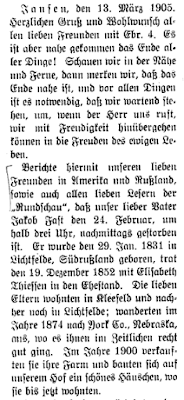Leave enough room between your lines of German transcription to write a word-for-word translation of English above it. Once you understand a sentence or a paragraph, you can massage it into good English and write or type it on a separate page.
Nouns, verbs, and adjectives are usually fairly easy to translate. (It certainly helps to know some grammar, but it's not essential.) You look them up in a dictionary and can get an English equivalent. Words may have several related meanings, and initially you may not know which meaning fits in your sentence, so you may write several meanings for one word until you figure out the whole sentence. Online dictionaries I like are Reverso and LEO, but there are many out there. If you want a physical dictionary, Oxford-Duden is a good one; but I find that I rarely use it because it is so much easier to look up words online.
These are dictionaries of modern German, but the language we will be reading is a century or two old, so there will be archaic words and expressions. Plus our ancestors wrote a High German that was influenced by Low German and by Russian, so pay special attention to the meanings that are marked as "obsolete" or "dialect" when doing your translation.
It's also helpful to have a 19th-century German-English dictionary, and G. J. Adler published the first one, A Dictionary of the German and English Languages, in the mid-1800s. You can buy it used online, but it is not cheap. However, Google scanned a copy, and it can be downloaded free as a PDF. Since it is a scan, not all the pages are readable, but most are. Adler's dictionary has helped me figure out more than one tough translation.
Ernest Thode's German-English Genealogical Dictionary is also frequently recommended, but I have not used it. Also, Edna M. Bentz wrote If I Can, You Can Decipher Germanic Records which is cheaper and has a good glossary, as well as lots of examples of how letters are formed. You may find yourself consulting many other dictionaries, such as legal, medical, or agricultural, when you run across a tough word, many of which are online.
What about Google Translate or other machine translators? I find it has a role to play as an aid. Sometimes, if I can't figure out a word or a sentence, I may try Google Translate to see what it says. Sometimes it's right, and sometimes it's not, especially on older and less formal language. I also like it when I have a long passage to translate and just need to get the gist of it.
Harder than the nouns, verbs, and adjectives is translating the adverbs, conjunctions, and prepositions and the endings that show verb tense and sentence structure (what linguists would call the inflection). Reverso has a page where you can get the conjugation (past, present, future, etc.) of any German verb, which can help a lot for figuring out the meaning of a sentence.
University of Michigan has a good page on German conjunctions that can help you understand sentence structure. And here is a page on German pronouns.
Now for some practice - here is part of the obituary of my great-great-grandfather, Jacob Fast. First, the scan of a couple paragraphs from the Mennonitische Rundschau and then below that my English translation. Try to translate the German and see if you can get something similar to my English translation. BTW, translations by two different people that are equally correct will be different in wording and phrasing, so don't worry if yours is a little different than mine.
 |
|
Jacob Fast, Letter to the Editor, Mennonitische Rundschau under Herold der Wahrheit, Elkhart,
Indiana, 22 March 1905, p. 3. Held by
Centre for Mennonite Brethren Studies, Winnipeg, Manitoba.
|
 |
| Translation by Steve Fast |
Next find some German documents relevant to your family and practice translating them. It's easier to work with printed documents so that you don't have to worry about deciphering script at this point. And working with documents from your family should motivate you to persevere as you discover new things about your ancestors.
BTW, I get mentally tired of translating after a while, sometimes 30 minutes, sometimes a couple hours. Then I take a break and come back - often the second time around, sentences that were impossible to understand become clear.
You've got your homework - good luck!
No comments:
Post a Comment